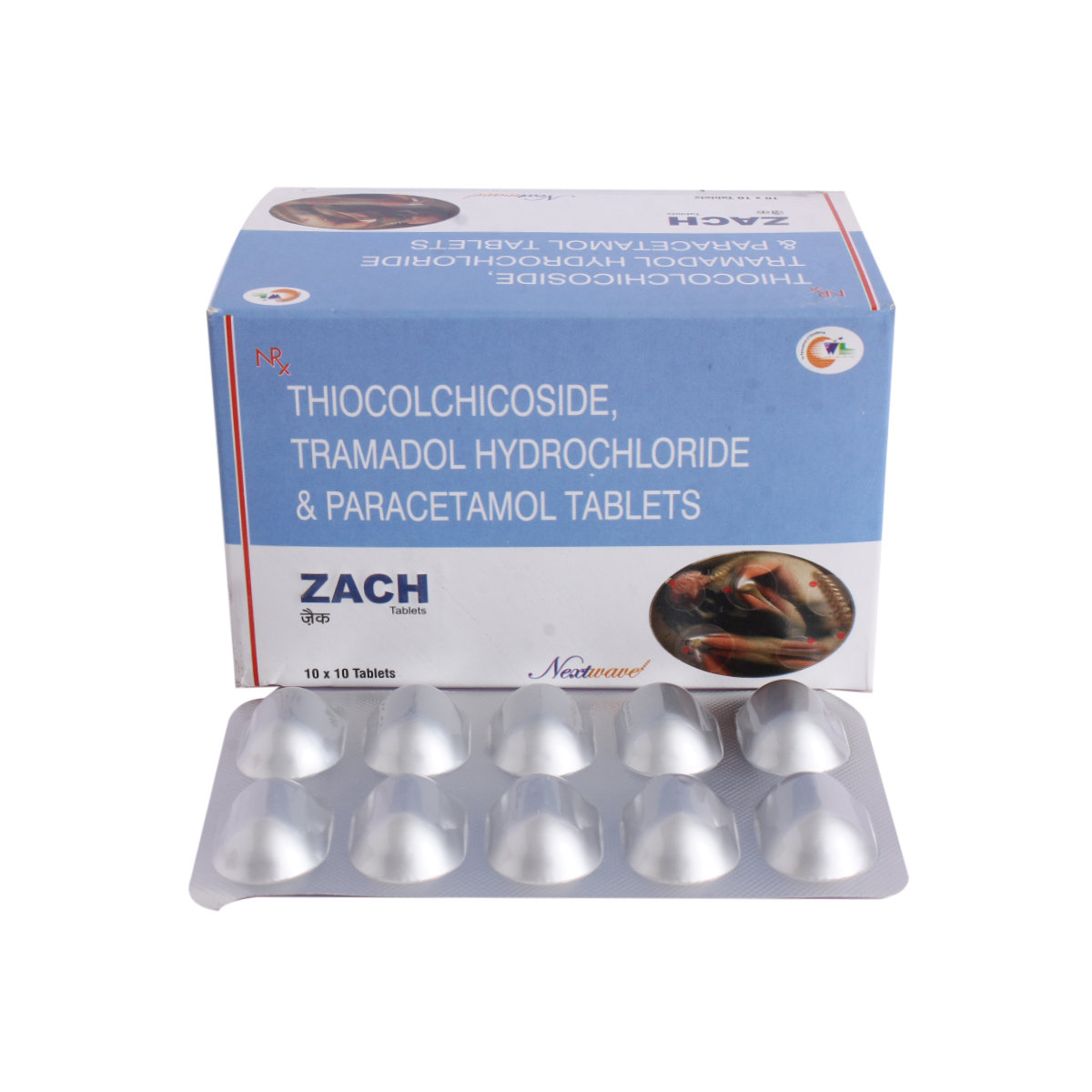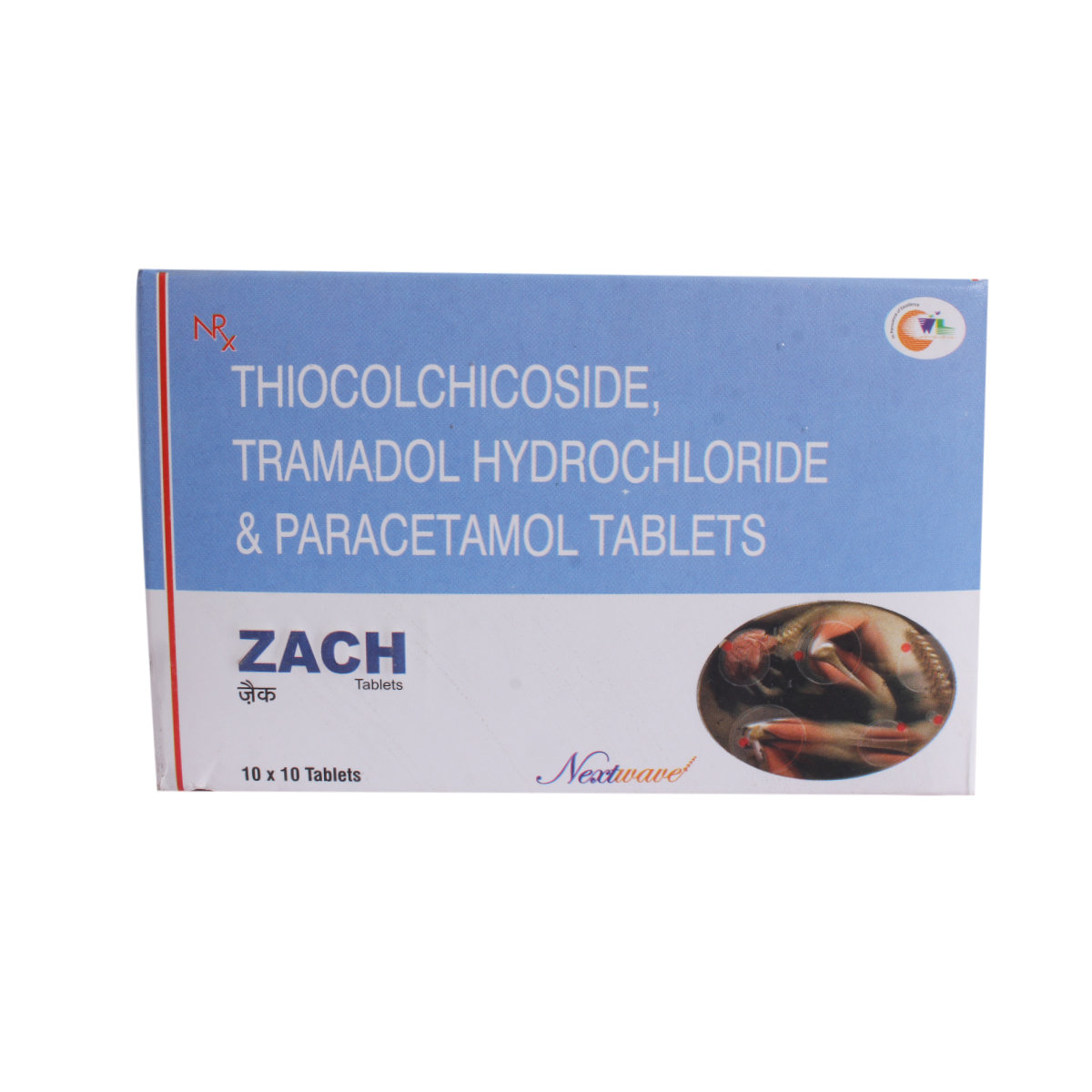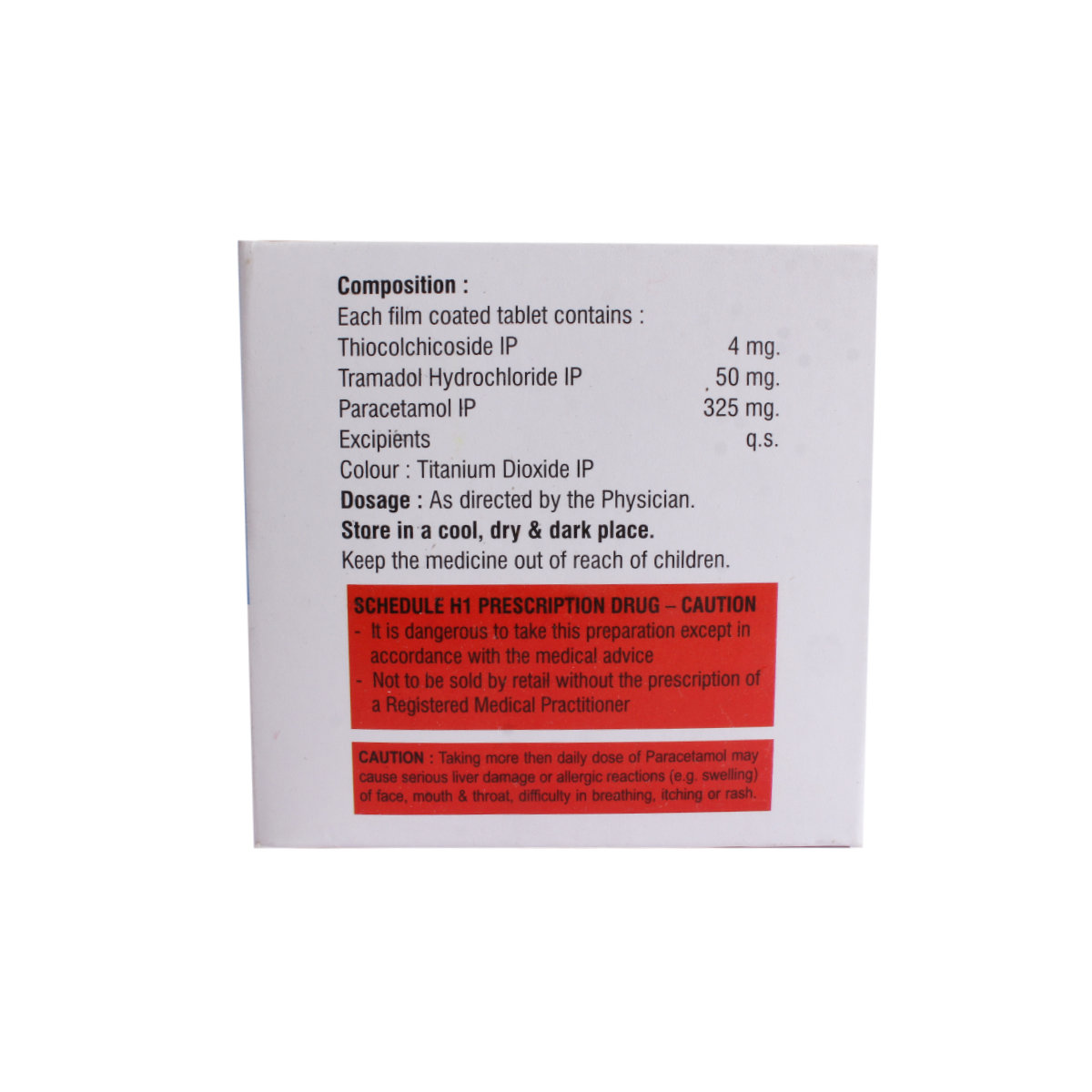Zach Tablet 10's




MRP ₹318.5
(Inclusive of all Taxes)
₹47.8 Cashback (15%)
Zach Tablet is used to relieve severe acute pain and is effective in managing conditions such as muscle pain, joint pain, back pain, and cramps. In some cases, this medicine may cause side effects such as nausea, vomiting, constipation, drowsiness and dryness in mouth. Before taking this medicine, inform the doctor if you are pregnant or breastfeeding, taking any other medication, or have any pre-existing medical condition.
Know Your Delivery Time
Provide Delivery Location

Secure Payment

India's Most Trusted Pharmacy

Genuine Products
Manufacturer/Marketer :
Consume Type :
Return Policy :
Expires on or after :
About Zach Tablet
Zach Tablet is a combination medicine that belongs to the class of analgesics. It is used to relieve severe acute pain and is effective in managing conditions such as muscle pain, joint pain, back pain, and cramps. It also helps reduce muscle stiffness and spasms, improving muscle movement and flexibility.
Zach Tablet is the combination of Paracetamol, Thiocolchicoside and Tramadol. Paracetamol works by blocking cyclooxygenase (COX) enzymes in the brain, hence lowering prostaglandin production and relieving pain and fever. Thiocolchicoside is a muscle relaxant that acts as a GABA-A receptor antagonist, reducing muscle spasms and spasticity. It also has mild anti-inflammatory and analgesic effects. Tramadol is a potent opioid pain reliever that works by inhibiting the transmission of pain signals to the brain, thereby reducing the perception of pain.
Take Zach Tablet as prescribed. Your doctor will provide guidance on the appropriate frequency for taking your tablets, depending on your medical condition. In some cases, you may experience nausea, vomiting, constipation, drowsiness and dryness in mouth. Most of these side effects of Zach Tablet do not require medical attention and gradually resolve over time. However, if the side effects continue or become severe, it is important to consult your doctor.
Avoid taking Zach Tablet if you are allergic to it. This medication is not recommended for individuals with liver disease, heart conditions, or a history of stomach disorders. Avoid drinking alcohol, as it can harm your liver and increase the risk of additional side effects while using this medication. It is advisable not to exceed the prescribed dose or duration of treatment. Inform your doctor if you have liver or kidney disease, severe heart problems and epilepsy.
Uses of Zach Tablet
Zach Tablet is used in the treatment of severe acute pain. The detailed uses of Zach Tablet are as follows:
- Pain Management:Zach Tablet helps manage pain by reducing fever and pain sensations, blocking pain signals to the brain, and providing discomfort relief.
- Muscle Relaxation:Zach Tablet helps to relieve muscle stiffness and spasms, improving muscle movement and flexibility.

Have a query?
Directions for Use
- Zach Tablet can be taken with or without food, as advised by your doctor.
- Follow your doctor's instructions on the dosage and timing of this medication for effective results.
- Swallow Zach Tablet as a whole with a glass of water.
- Do not break, chew or crush Zach Tablet .
Medicinal Benefits
Zach Tablet contains Paracetamol, Thiocolchicoside, and Tramadol. Zach Tablet is used to treat severe acute pain. Paracetamol acts as an analgesic by inhibiting the release of chemical mediators that cause pain. Thiocolchicoside is a muscle relaxant that acts as a GABA-A receptor antagonist, reducing muscle spasms and spasticity. Tramadol targets pain receptors in the central nervous system. It acts by blocking the nerve signals responsible for pain. Altogether, they effectively reduce pain and inflammation.
How Zach Tablet Works
Storage
- Inform your doctor about the nausea and discuss possible alternatives to the medication or adjustments to the dosage.
- Divide your daily food intake into smaller, more frequent meals to reduce nausea.
- Opt for bland, easily digestible foods like crackers, toast, plain rice, bananas, and applesauce.
- Avoid certain foods that can trigger nausea, such as fatty, greasy, spicy, and smelly foods.
- Drink plenty of fluids, such as water, clear broth, or electrolyte-rich beverages like coconut water or sports drinks.
- Use ginger (tea, ale, or candies) to help relieve nausea.
- Get adequate rest and also avoid strenuous activities that can worsen nausea.
- Talk to your doctor about taking anti-nausea medication if your nausea is severe.
- Record when your nausea occurs, what triggers it, and what provides relief to help you identify patterns and manage your symptoms more effectively.
- Inform your doctor about your constipation symptoms. They may adjust your medication or advise alternative treatments.
- Stay hydrated by drinking sufficient of water (at least 8-10 glasses a day) to help soften stool and promote bowel movements.
- Increase fibre intake by eating foods high in fibre, such as fruits, whole grains, vegetables and legumes, to help bulk up the stool.
- Establish a bowel routine by trying to go to the bathroom at the same time each day to train your bowels.
- Engaging in regular exercise, like walking or yoga, can support in bowel movement stimulation.
- Consult your doctor if constipation persists, and discuss alternative treatments or adjustments to your medication.
- Take medications with food (if recommended): It can help prevent stomach distress and indigestion.
- Eat smaller, more frequent meals: Divide daily food intake into smaller, more frequent meals to ease digestion.
- Avoid trigger foods: Identify and avoid foods that trigger indigestion, such as spicy, fatty, or acidic foods.
- Stay upright after eating: Sit or stand upright for at least 1-2 hours after eating to prevent stomach acid from flowing into the oesophagus.
- Avoid carbonated drinks: Avoid drinking carbonated beverages, such as soda or beer, which can worsen indigestion.
- Manage stress: To alleviate indigestion, engage in stress-reducing activities like deep breathing exercises or meditation.
- Consult a doctor if needed: If indigestion worsens or persists, consult a healthcare professional to adjust the medication regimen or explore alternative treatments.
- Avoid driving or operating machinery or activities that require high focus until you know how the medication affects you.
- Maintain a fixed sleeping schedule, create a relaxing bedtime routine and ensure your sleeping space is comfortable to maximize your sleep quality.
- Limit alcohol and caffeine as these may worsen drowsiness and disturb sleep patterns.
- Drink plenty of water as it helps with alertness and keeps you hydrated and for overall well-being.
- Moderate physical activity can improve energy levels, but avoid intense workouts right before bedtime.
- Consume more fruits, vegetables, and cruciferous foods like cabbage, kale, and broccoli.
- Reduced alcohol intake can enhance liver enzyme function.
- Oxidative stress can be managed by eating foods rich in antioxidants, such as vitamins C and E.
- Liver function tests regularly can help manage increased levels of AST.
- Drink water or other clear fluids.
- To prevent worsening of pain, limit intake of tea, coffee, or alcohol.
- Include bland foods like rice, toast, crackers, and rice in your diet.
- Avoid lying down immediately after eating as it may cause indigestion or heartburn.
- Avoid acidic and spicy food as it may cause indigestion.
What if I have taken an overdose of Zach Tablet
Drug Warnings
Consumption of alcohol should be avoided during treatment with Zach Tablet as it may increase the risk of liver damage. Patients with stomach disorders, severe heart failure, high blood pressure, or liver or kidney disease should not take Zach Tablet without medical supervision. Inform your doctor if you are pregnant, taking other medications, or have any pre-existing medical conditions. Zach Tablet may be excreted in breast milk, so consult your doctor before breastfeeding. Exercise caution when driving or operating machinery.
Drug-Drug Interactions
Drug-Drug Interactions
Login/Sign Up
Co-administration of Linezolid with Zach Tablet can increase the risk of serotonin syndrome and seizures.
How to manage the interaction:
Taking Linezolid with Zach Tablet is not recommended, consult a doctor before taking it. Consult a doctor if you experience confusion, hallucination, seizure, extreme changes in blood pressure, increased heart rate, fever, excessive sweating, shivering or shaking, blurred vision, muscle spasm or stiffness, tremor, incoordination, stomach cramp, nausea, vomiting, and diarrhea. Do not stop using any medications without talking to a doctor.
Co-administration of Ziprasidone with Zach Tablet can increase the risk of irregular heart rhythm.
How to manage the interaction:
Taking Zach Tablet with Ziprasidone together can possibly result in an interaction, but it can be taken if a doctor has advised it. However, consult a doctor immediately if you experience sudden dizziness, lightheadedness, fainting, shortness of breath, or heart palpitations. Do not discontinue any medications without consulting a doctor.
Taking Safinamide with Zach Tablet can increase the risk of serotonin syndrome (A condition in which a chemical called serotonin increase in your body).
How to manage the interaction:
Taking Safinamide with Zach Tablet is not recommended as it can possibly result in an interaction, but can be taken together if prescribed by a doctor. However, consult a doctor if you experience confusion, hallucination(seeing and hearing things that do not exist), fits, blood pressure alteration, increased heart rate, fever, excessive sweating, shivering or shaking, blurred vision, pain in the muscles or stiffness, incoordination, stomach cramps, nausea, vomiting, and loose stools. Do not discontinue any medications without consulting your doctor.
Taking rasagiline with Zach Tablet can increase the risk of serotonin syndrome (A condition in which a chemical called serotonin increase in your body).
How to manage the interaction:
Taking Zach Tablet with Rasagiline is not recommended, as it can lead to an interaction, but can be taken if advised by your doctor. However, if you experience any symptoms like severe headache, blurred vision, confusion, seizures, chest pain, nausea or vomiting, sudden numbness or weakness (especially on one side of the body), speech difficulties, fever, sweating, lightheadedness, and fainting, contact your doctor immediately. Do not discontinue any medications without first consulting your doctor.
Combining Tranylcypromine with Zach Tablet can increase the risk of serotonin syndrome (a condition in which a chemical called serotonin increase in your body).
How to manage the interaction:
Taking Tranylcypromine with Zach Tablet is not recommended, but can be taken together if prescribed by a doctor. However, consult a doctor if you experience confusion, hallucination(seeing and hearing things that do not exist), fits, blood pressure alteration, increased heart rate, fever, excessive sweating, shivering or shaking, blurred vision, pain in the muscles or stiffness, incoordination, stomach cramps, nausea, vomiting, and diarrhea. Do not discontinue any medications without consulting your doctor.
Combining Phenelzine with Zach Tablet can increase the risk of serotonin syndrome and seizures.
How to manage the interaction:
Taking Zach Tablet with Phenelzine is not recommended, please consult your doctor before taking it.
Co-administration of Zach Tablet with Alvimopan can make the side effects worse or more dangerous.
How to manage the interaction:
Taking Alvimopan with Zach Tablet is not recommended, please consult your doctor before taking it.
Co-administration of ketamine and Zach Tablet may decrease the effectiveness of Ketamine which could result in a higher blood level.
How to manage the interaction:
Although taking Ketamine and Zach Tablet together can evidently cause an interaction, it can be taken if a doctor has suggested it. If you're feeling very sleepy or having trouble breathing, it's important to contact your doctor right away. Do not stop using any medications without a doctor's advice.
Co-administration of Zach Tablet and Ketoconazole may increase the risk of liver injury.
How to manage the interaction:
Although there is a possible interaction between Zach Tablet and Ketoconazole, you can take these medicines together if prescribed by a doctor. However, if you have joint pain or swelling, fever, chills, unusual bleeding or bruising, skin rash, itching, over-tiredness, nausea, vomiting, loss of appetite, stomach pain, dark-colored urine, light-colored stools, and/or yellowing of the skin or eyes, contact a doctor immediately as these may be signs and symptoms of liver damage. Do not discontinue the medication without consulting a doctor.
Co-administration of Mipomersen with Zach Tablet may increase the risk or severity of liver injury.
How to manage the interaction:
There may be a possibility of interaction between Zach Tablet and Mipomersen, but it can be taken if prescribed by a doctor. Do not stop using any medications without talking to a doctor.
Drug-Food Interactions
Drug-Food Interactions
Login/Sign Up
Diet & Lifestyle Advise
- Consistent exercise aids in stretching muscles, reducing the risk of spasms, tears, and sprains. Low-impact activities like jogging and walking are beneficial for improving muscle flexibility.
- Hot or cold therapy can help treat muscle spasms. Apply an ice pack or hot pack on the muscle for 15-20minutes.
- Avoid wearing tight-fitting clothes, instead, wear loose garments.
- Do not take alcohol.
- Take adequate rest whenever required.
- Avoid driving or operating heavy machinery.
Habit Forming
Therapeutic Class
All Substitutes & Brand Comparisons
Alcohol
Unsafe
Taking excessive alcohol with Zach Tablet can cause liver damage. So, it is advisable to avoid intake of alcohol during the treatment with Zach Tablet .
Pregnancy
Consult your doctor
Please consult your doctor before taking Zach Tablet if you are pregnant or planning to conceive.
Breast Feeding
Caution
If Zach Tablet is prescribed during breastfeeding, the doctor may advise you to stop breastfeeding as this medicine can pass into breast milk.
Driving
Caution
Avoid driving or operating heavy machinery after taking Zach Tablet as you may feel sleepy.
Liver
Caution
If you have liver problems, inform your doctor before taking Zach Tablet as this medicine may worsen your condition.
Kidney
Caution
Zach Tablet should be used with caution in patients with renal impairment.
Children
Consult your doctor
If you have any concerns regarding the use of Zach Tablet for children, please consult a doctor.
Heart
Please inform your doctor if you have heart problems before taking Zach Tablet , as there is limited information available on its safety in such cases.
Geriatrics
Caution
Geriatric patients can take Zach Tablet , but only with careful medical supervision.
FAQs
Zach Tablet is used in the treatment of severe acute pain.
Zach Tablet contains Paracetamol, Thiocolchicoside and Tramadol. Paracetamol reduces pain and fever by inhibiting COX enzymes in the brain. Thiocolchicoside relaxes muscles and reduces spasms by acting on GABA-A receptors, with mild anti-inflammatory effects. Tramadol blocks pain signals to the brain, acting as a strong pain reliever.
Your doctor decides the dose and duration of the medicine depending on your health condition.
No, never take a higher dose of Zach Tablet other than the dose recommended by your doctor. Taking more than the prescribed dose can lead to unpleasant side effects. Always follow your doctor's advice and the recommended dosage instructions for safe and effective treatment. Consult your doctor if you have concerns.
Zach Tablet may cause side effects like nausea, vomiting, constipation, drowsiness and dryness in mouth. If these side effects persist stop taking Zach Tablet and consult your doctor immediately.
You are recommended to inform your doctor before taking any other medicines with Zach Tablet . Your doctor will notify you regarding medicines that should not be taken along with Zach Tablet .
Do not stop taking Zach Tablet without consulting your doctor, as it may reduce the medication’s effectiveness. To treat your condition effectively, continue taking Zach Tablet for as long as prescribed by your doctor.
Country of origin
Manufacturer/Marketer address
Disclaimer
Reference
- https://pubmed.ncbi.nlm.nih.gov/15662292/
- https://www.drugs.com/paracetamol.html#interactions
- https://pubchem.ncbi.nlm.nih.gov/compound/Thiocolchicoside#section=Safety-and-Hazards
- https://www.drugs.com/tramadol.html#interactions
- https://www.webmd.com/drugs/2/drug-4398-5239/tramadol-oral/tramadol-oral/details
Buy best C.n.s Drugs products by
Intas Pharmaceuticals Ltd
Sun Pharmaceutical Industries Ltd
Torrent Pharmaceuticals Ltd
Alkem Laboratories Ltd
Alteus Biogenics Pvt Ltd
Abbott India Ltd
Cipla Ltd
Micro Labs Ltd
Lupin Ltd
Tripada Healthcare Pvt Ltd
D D Pharmaceuticals Pvt Ltd
Ipca Laboratories Ltd
Arinna Lifesciences Ltd
Icon Life Sciences
Linux Laboratories Pvt Ltd
Mankind Pharma Pvt Ltd
Cnx Health Care Pvt Ltd
East West Pharma India Pvt Ltd
La Renon Healthcare Pvt Ltd
Eris Life Sciences Ltd
Emcure Pharmaceuticals Ltd
Leeford Healthcare Ltd
Talent India Pvt Ltd
Tas Med India Pvt Ltd
Consern Pharma Ltd
Macleods Pharmaceuticals Ltd
Zydus Healthcare Ltd
Jagsam Pharma
Troikaa Pharmaceuticals Ltd
Dr Reddy's Laboratories Ltd
Ikon Pharmaceuticals Pvt Ltd
Sigmund Promedica
Matias Healthcare Pvt Ltd
Aristo Pharmaceuticals Pvt Ltd
Ardent Life Sciences Pvt Ltd
Shine Pharmaceuticals Ltd
Zydus Cadila
Theo Pharma Pvt Ltd
Wockhardt Ltd
Propel Healthcare
Lifecare Neuro Products Ltd
Crescent Formulations Pvt Ltd
Reliance Formulation Pvt Ltd
Mesmer Pharmaceuticals
Matteo Health Care Pvt Ltd
Morepen Laboratories Ltd
Capital Pharma
Neon Laboratories Ltd
Ajanta Pharma Ltd
Med Manor Organics Pvt Ltd
Lyf Healthcare
Msn Laboratories Pvt Ltd
Sanix Formulation Pvt Ltd
Akumentis Healthcare Ltd
Brainwave Healthcare Pvt Ltd
Pulse Pharmaceuticals
Hetero Healthcare Pvt Ltd
Sanofi India Ltd
Solvate Laboratories Pvt Ltd
Cyrus Remedies Pvt Ltd
Elder Pharmaceuticals Ltd
Novartis India Ltd
Psyco Remedies Ltd
Medishri Healthcare Pvt Ltd
Alniche Life Sciences Pvt Ltd
Crescent Therapeutics Ltd
Hbc Life Sciences Pvt Ltd
Mova Pharmaceutical Pvt Ltd
Quince Lifesciences Pvt Ltd
Cadila Healthcare Ltd
Prevego Healthcare & Research Pvt Ltd
Tripada Lifecare Pvt Ltd
Alembic Pharmaceuticals Ltd
Talin Remedies Pvt Ltd
Kivi Labs Ltd
Serotonin Pharmaceuticals Llp
Solis Pharmaceuticals
Glenmark Pharmaceuticals Ltd
Infivis Life Care
Trion Pharma India Llp
A N Pharmacia Laboratories Pvt Ltd
Gagnant Healthcare Pvt Ltd
Primus Remedies Pvt Ltd
Crescent Pharmaceuticals
Glarizonto Pharma Pvt Ltd
Knoll Healthcare Pvt Ltd
Zuventus Healthcare Ltd
Arches Pharmaceuticals
Cadila Pharmaceuticals Ltd
Lia Life Sciences Pvt Ltd
Lyceum Life Sciences Pvt Ltd
USV Pvt Ltd
Vasu Organics Pvt Ltd
Wallace Pharmaceuticals Pvt Ltd
Corona Remedies Pvt Ltd
Glial Life Science Llp
Lincoln Pharmaceuticals Ltd
Maneesh Pharmaceuticals Ltd
Pfizer Ltd
Suraksha Pharma Pvt Ltd



